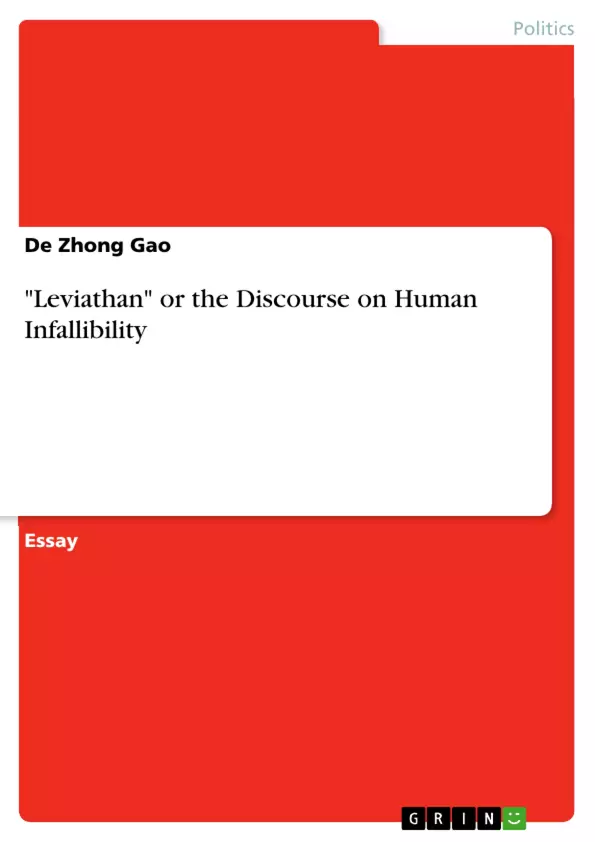In this essay, I examine Hobbes' account of the state of nature and propose that the Hobbesian account of the sovereign's right to make decisions about what doctrines and beliefs be taught to his subjects is flawed. +++ Thomas Hobbes’s discussion of the state of nature is necessary to understand the
nature and powers of the sovereign in a commonwealth. A commonwealth is a person, or a
group of men who defend people from foreigners and from the injuries of one another, and
compel their performance to their covenant by fear [Penguin Classics edition’s page
numbers].1 This essay argues that Hobbes’s claim that the sovereign has the power and right
to judge what opinions and doctrines are fit to be taught is flawed because the sovereign’s
judgment can be erroneous and consequentially provoke grievances, resulting in civil war.
To do so, I will first examine how according to Hobbes’s fundamental law of nature, men
endeavour to live in peace, justifying the need for a commonwealth and sovereign to have
power and the right to judge what opinions and doctrines are fit to be taught. I will also
explain how the sovereign’s right to make judgments helps men to avoid the state of nature.
Then, I will analyze how the sovereign can make erroneous judgments, resulting in abuses of
speech and dissidence. Finally, I will refute the challenging counter-argument to my thesis,
which claims that erroneous doctrines are subjective, for neither the sovereign nor his
subjects can realize that erroneous doctrines have been made. [...]
Inhaltsverzeichnis (Table of Contents)
- Essay Question 1
- Leviathan or the Discourse on Human Infallibility
Zielsetzung und Themenschwerpunkte (Objectives and Key Themes)
This essay explores the flaws in Thomas Hobbes's argument that the sovereign has the absolute right to judge what opinions and doctrines are fit to be taught. The essay aims to demonstrate that the sovereign's judgment can be erroneous, leading to grievances and ultimately, civil war.
- The role of the sovereign in maintaining peace and order in a commonwealth.
- The potential for the sovereign to make erroneous judgments about opinions and doctrines.
- The dangers of false doctrines and their impact on speech and social harmony.
- The subjective nature of truth and the challenges of identifying erroneous judgments.
- The potential for civil war when the sovereign's judgments fail to ensure unity in thought and action.
Zusammenfassung der Kapitel (Chapter Summaries)
This essay examines Hobbes's argument that the sovereign should have the authority to determine the appropriate doctrines and opinions to be taught in a commonwealth. It begins by outlining Hobbes's concept of the state of nature and the necessity of a sovereign to enforce social contracts and maintain peace. The essay then explores how the sovereign's right to judge doctrines can help to prevent the return to a state of nature by setting constraints on individual desires for power and controlling potentially disruptive speech.
The essay then analyzes how the sovereign can make erroneous judgments, leading to false doctrines that can incite conflict and ultimately undermine the peace the sovereign is supposed to protect. The essay concludes by addressing the counter-argument that erroneous judgments are subjective and challenging the claim that the sovereign can always ensure that the chosen doctrines will lead to peace and stability.
Schlüsselwörter (Keywords)
The key themes of the essay include the power of the sovereign, the nature of truth and error, the potential for civil war, the role of speech in social conflict, and the inherent challenges of maintaining peace in a society where individuals are driven by ambition and desire for power. The essay also explores the dangers of false doctrines, the role of social contracts in establishing order, and the importance of unity in thought and action for social stability.
Frequently Asked Questions
What is Hobbes's "State of Nature"?
According to Thomas Hobbes, the state of nature is a condition of perpetual war where life is "solitary, poor, nasty, brutish, and short," necessitating a sovereign power to maintain peace.
Why does the sovereign have the right to judge doctrines?
Hobbes argues that to prevent civil war and maintain order, the sovereign must have the authority to decide which opinions and beliefs are fit to be taught to the subjects.
What is the main flaw in Hobbes's argument regarding sovereign judgment?
The essay argues that the sovereign is human and can make erroneous judgments, which may provoke grievances and lead to the very civil war the sovereign was meant to prevent.
How can false doctrines lead to social conflict?
False doctrines can incite dissidence and abuses of speech, creating divisions in thought and action that undermine the unity of the commonwealth.
Is truth subjective in Hobbes's Leviathan?
The essay discusses the subjective nature of truth and the challenges both the sovereign and subjects face in identifying when an erroneous doctrine has been established.
What is the role of a "Commonwealth" according to Hobbes?
A commonwealth is a person or group that defends people from foreign enemies and internal injuries, compelling social performance through fear and covenants.
- Citation du texte
- De Zhong Gao (Auteur), 2012, "Leviathan" or the Discourse on Human Infallibility, Munich, GRIN Verlag, https://www.grin.com/document/190456



